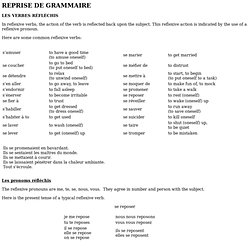

Verbes-pronominaux.jpg (JPEG Image, 1301 × 1151 pixels) - Scaled (78%) LEARN FRENCH WITH MONSIEUR GUY #2. Verbes pronominaux au présent - Apprendre le français – Cours et exercices gratuits. 19 : verbes pronominaux. French Reflexive Verbs: 6 Things You Should Definitely Know About It - Talk in French. Reading time: 4 minutesDifficulty: Intermediate- Advanced I can sense your reaction.

It goes like this: French reflexive verbs? Say whaat? But fear not, we will change all that with a quick read. Before you know it, you’ll be quite knowledgeable about the topic (or not), it all really depends on how interested you are. 1. Reflexive verbs are action words that refer to the same subject and object. In English, it often appears with reflexive pronouns such as myself, himself, herself, or themselves.
Reflexive verbs work basically the same way in French as in English. 2.What it is made up of. A reflexive verb consists of a reflexive pronoun and a verb. Some common examples: 3. The group of verbs known as reflexive verbs share some distinct commonalities. They all have something to do with body parts, hygiene, personal states, clothing, or location.The reflexive verbs are also often used to describe the common everyday things you do to yourself. 4. Note that: For example: Je me lève. Verbes pronominaux au présent. Vpr1: pronominal verbs. Verbes réfléchis.
In reflexive verbs, the action of the verb is reflected back upon the subject.

This reflexive action is indicated by the use of a reflexive pronoun. Here are some common reflexive verbs: Ils se promenaient en bavardant. Ils se sentaient les maîtres du monde. Ils se mettaient à courir. Ils se laissaient pénétrer dans la chaleur ambiante. Les pronoms réfléchis The reflexive pronouns are me, te, se, nous, vous. Here is the present tense of a typical reflexive verb. se reposer Here is the passé composé of the same reflexive verb. In questions and negative sentences, place reflexive pronouns following the same rules as for object pronouns. The pronouns me, te, and se become m’, t’, s’ before a verb beginning with a vowel or a silent h. In infinitive constructions, the reflexive pronouns agree with the subject. Ile hésitaient à se lever de table. In the affirmative imperative, place the reflexive pronouns after the verb and connect them to the verb with a hyphen. Les Verbes réciproques. Les verbes réfléchis. French Reflexive Verbs List. Se maquiller is a reflexive verb that means to put on make up.

Source So you've gotten so far as to understand and be able to use reflexive verbs correctly and now you're looking for a French reflexive verbs list? When you memorize reflexive verbs, remember to include the reflexive pronoun in the conjugation. Many of the words can be used without the reflexive pronoun but would have a different meaning or implication. Common French Reflexive Verbs Remember, reflexive verbs have mostly to do with emotion, one's body, or location. To Approach Verb: s'approcher deConjugation: regular -er vebUsed in a sentence: Je m'approche de la maison. To Sit Down Verb: s'asseoirConjugation: irregular vebUsed in a sentence: Tous les étudiants, s'il vous plait, asseyez-vous! To Bathe or Swim Verb: se baignerConjugation: regular -er verbUsed in a sentence: Nous baignons dans la mer!
To Brush.